Healing Through Rowing
One Woman’s Story of Surviving Breast Cancer
By Pattie Cinelli | Hill Rag
Nancy Kellner was doing what she loved to do. At 44 she had a career that allowed her to travel the world, bring companies public, build and restructure businesses, and rise to partner and general counsel positions as a corporate and securities lawyer.
She speaks several languages fluently, has a loving husband, and takes pride in staying in shape. “I like being competitive in both my personal and professional life,” she says. “I like to do well. I like to win, and I like to move at a fast pace.”
Living life hard and fast has its benefits, but it also can take a toll. In the late 1990s her work at a corporate law firm was exciting, but “I was becoming a victim of my own success.”
She got sick a lot – bronchitis, pneumonia, a broken bone in her foot – most she attributed to stress.
In 2000, though it was difficult, she left the firm to become an in-house general counsel and vice president for a startup satellite-based broadband telecommunications company. “I wanted a saner lifestyle.”
The company folded in 2002, and with a year’s salary and benefits, Nancy chose to take a year off to rest, recuperate and figure out what comes next. She finally had time to pursue her newly discovered passion: rowing. “I did a fundraiser for the Georgetown Prep crew team the year before. When I got out on the water I was hooked.”
Trough the prodding and encouragement of her husband, Chris, Nancy joined a novice rowing program. In the fall she took a week to attend the Craftsbury Sculling Camp in Vermont. “I got sick with a sinus infection, but I rowed everyday. It was a terrific experience.”
January 15, 2003. Nancy went for a routine mammogram. A few days later a notice came in the mail to return to take more pictures. “I was scared out of my mind. They took more film. Then they did a sonogram. They told me I needed to make an appointment to see a surgeon. It all seemed so unreal.”
She researched, made phone calls and finally chose a surgeon to whom her intern would have sent his wife. She had a lumpectomy, radiation, physical therapy and a new outlook on life.
“The diagnosis, surgery and treatment caused me to feel and want to be distant from my body. I worked my mind hard to stay positive and focused on killing the bad cells, but the body was bruised, burned and exhausted.”
“The diagnosis, surgery and treatment caused me to feel and want to be distant from my body. I worked my mind hard to stay positive and focused on killing the bad cells, but the body was bruised, burned and exhausted.”
When Nancy called a national breast cancer support group to see when she could get back to rowing, the woman on the phone said, “Oh no baby, you can kiss all that goodbye.”
She refused to accept the negative prognosis. “I was an athlete all my life. I was determined to get my body back.”
She stopped watching news and spent a lot of time watching Animal Planet, reruns of Seinfeld and Friends, and just about any comedy she could get her hands on. Nancy also began spending time with her neighbor’s dog, Kirby. “We would go for long walks and snuggle on my couch watching Dr. Phil and Oprah together.”
An angel appeared in the form of a rowing friend who e-mailed Nancy an article about a group of breast cancer survivors in Boston who row. It was 10 days after she completed her treatment. “I flew to Boston and spent just a couple of hours rowing with these women who all were going through what I went through.” She felt hopeful and even a little optimistic.
Th Boston-based group WeCanRow National began as a division of the Row As One Institute Inc., bringing world-class coaching and custom-designed programs to girls and women of all cultures. The program begins where surgery and physical therapy leave off, creating new opportunities to heal, both physically and emotionally. The DC program designed for women who have survived breast cancer, started in the spring of 2005 with the first Learn to Row weekend held at the Capital Rowing Club.
“Rowing is a full body/mind sport. It is technically and physically demanding, requiring strength, aerobic fitness, endurance and mental focus,” explains Nancy. “It is a joyous sport, working with others in a goal to move well, carrying these 250-plus-pound shells. It is a peaceful sport as well, being out on the water and away from most city noises.”
Nancy is now in her fifth year of recovery. She gave up her corporate and securities law practice and started a dog training business. She counsels clients on laws affecting dogs and their owners. She also has found a dog to call her own – Toby – to whom she credits at least part of her recovery.

